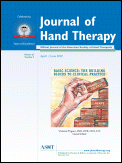
Journal of Hand Therapy
Scope & Guideline
Exploring the forefront of rehabilitation techniques.
Introduction
Aims and Scopes
- Rehabilitation Techniques and Protocols:
The journal emphasizes evidence-based rehabilitation techniques, including various therapeutic approaches such as Kinesio taping, exercise programs, and the use of orthoses. - Clinical Assessment and Measurement Tools:
A significant focus on developing and validating clinical assessment tools for measuring hand function, grip strength, and other relevant outcomes in therapeutic settings. - Innovative Therapies and Technologies:
Exploration of new technologies and methodologies in hand therapy, including the use of telehealth, robotics, and 3D-printed solutions for orthopedic conditions. - Patient-Centered Care and Outcomes:
Research that prioritizes patient experiences, satisfaction, and outcomes, emphasizing the importance of patient-reported measures in evaluating therapy effectiveness. - Multidisciplinary Approaches:
Encouragement of multidisciplinary research involving hand therapists, surgeons, and other healthcare professionals to enhance treatment methodologies and patient care.
Trending and Emerging
- Telehealth and Remote Rehabilitation:
An increasing number of studies focus on the effectiveness and feasibility of telehealth and remote rehabilitation strategies, especially in light of the recent global shift towards digital healthcare. - Proprioception and Sensory Integration:
Research on proprioception, sensory feedback, and their roles in rehabilitation has become more prominent, highlighting the importance of these factors in recovery from hand injuries. - Patient-Reported Outcomes and Satisfaction:
There is a growing emphasis on understanding patient-reported outcomes, satisfaction, and engagement in the therapeutic process, pointing to a more patient-centered approach in research. - Innovative Orthotic Solutions:
A trend towards exploring novel orthotic designs, including relative motion orthoses and 3D-printed devices, signifies a shift towards personalized and adaptive treatment options. - Multifactorial Approaches to Injury Prevention:
Emerging studies are increasingly addressing the multifactorial nature of upper extremity injuries, including ergonomic considerations and psychosocial factors, underscoring a holistic approach to prevention.
Declining or Waning
- Surgical Techniques and Interventions:
There has been a noticeable decline in articles specifically addressing surgical techniques for hand conditions, suggesting a shift towards non-operative management and rehabilitation. - Traditional Orthotic Designs:
Research on conventional orthotic designs has decreased, possibly due to the emerging interest in innovative and customized orthotic solutions, such as 3D printing. - Generalized Pain Management Strategies:
Articles focusing on broad pain management strategies without specific application to hand therapy are less frequent, indicating a shift towards targeted interventions. - Historical Perspectives and Reviews:
The journal has seen fewer articles that provide historical overviews or general reviews of hand therapy practices, reflecting a trend towards more current and evidence-based research.
Similar Journals
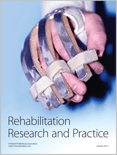
Rehabilitation Research and Practice
Advancing Rehabilitation Through Innovative Research.Rehabilitation Research and Practice is a distinguished open-access journal published by HINDAWI LTD, dedicated to advancing knowledge in the fields of rehabilitation, physical therapy, and sports therapy. With its ISSN 2090-2867 and E-ISSN 2090-2875, the journal has been a pivotal resource for researchers and practitioners since its inception in 2010. Based in Egypt and reaching an international audience, the journal encapsulates cutting-edge research and evidence-based practices that significantly contribute to patient care and rehabilitation strategies. Notably, it holds a reputable position in the Scopus rankings—42nd out of 161 in Medicine Rehabilitation and 74th out of 247 in Health Professions. The journal enjoys a Q2 status in the 2023 category quartiles, reflecting its influence and quality within the academic community. The journal's commitment to an open-access format not only enhances its visibility and accessibility but also fosters collaboration among professionals, making it an indispensable resource for anyone engaged in rehabilitation research and practice.
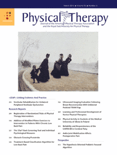
Physical Therapy
Innovating Therapeutic Techniques for Optimal Patient Care.Physical Therapy is a leading journal in the field of rehabilitation sciences, published by Oxford University Press Inc. Renowned for its rigorous peer-reviewed articles, the journal covers a broad range of topics within physical therapy, sports therapy, and rehabilitation, making it a vital resource for researchers, clinicians, and students. With an impressive impact factor and ranking—Q1 in its category (Physical Therapy, Sports Therapy and Rehabilitation) and ranked 19 out of 247 in Scopus—this journal stands at the forefront of advancing knowledge and practice in this vital health discipline. The journal has maintained its dedication to publishing original research, systematic reviews, and clinical studies since its inception in 1964, contributing significantly to evidence-based practices in the field. With a commitment to enhancing patient care and fostering professional development, Physical Therapy remains an essential platform for the dissemination of cutting-edge research and innovative therapeutic techniques.
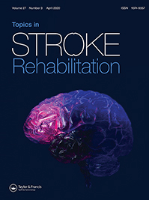
Topics in Stroke Rehabilitation
Connecting theory to practice in stroke care.Topics in Stroke Rehabilitation, published by Taylor & Francis Ltd, stands as a premier academic journal offering cutting-edge research and insights in the fields of rehabilitation, neurology, and community care. With an impressive impact factor reflecting its strong scholarly influence, this journal not only maintains a distinguished Q1 ranking in Community and Home Care and Rehabilitation but is also recognized in the Q2 category for Clinical Neurology, showcasing its relevance across multiple disciplines. Covering a comprehensive range of topics from neurorehabilitation techniques to patient-centered care strategies, Topics in Stroke Rehabilitation serves as an essential resource for researchers, healthcare professionals, and students dedicated to enhancing the quality of life for individuals recovering from stroke. With an accessible archive dating back to 1996 and continuous publication through 2024, this journal invites collaboration and discourse, fostering advancements in both theoretical knowledge and practical applications within the realm of stroke rehabilitation.
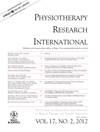
Physiotherapy Research International
Innovating Physiotherapy for Better Patient Outcomes.Physiotherapy Research International is a leading journal in the fields of Physical Therapy, Sports Therapy, and Rehabilitation, published by WILEY. With a commendable impact factor reflecting its significant contribution to the profession, this journal enjoys a competitive position, ranking in the 66th percentile and 84th out of 247 in its category according to Scopus. The journal encompasses a broad scope of research from 1996 to 2024, addressing critical advancements in physiotherapy and rehabilitation practices. Although it is not an Open Access journal, it provides valuable insights and research findings that foster knowledge and innovation among practitioners and researchers alike. As a Q2 category journal in its field for 2023, Physiotherapy Research International aims to facilitate the dissemination of high-quality research aimed at improving patient outcomes and guiding clinical practice. It serves as an essential resource for those committed to advancing the science and practice of physiotherapy.

Current Physical Medicine and Rehabilitation Reports
Navigating Innovations in Rehabilitation and RecoveryCurrent Physical Medicine and Rehabilitation Reports, published by SpringerNature, is an esteemed academic journal dedicated to advancing the fields of physical medicine and rehabilitation. With a focus on disseminating high-quality research and evidence-based practices, this journal covers a broad spectrum of topics including orthopedic medicine, sports therapy, and comprehensive rehabilitation strategies. While it currently holds a Q3 quartile ranking across several related categories, including medicine and rehabilitation, the journal aims to elevate its impact through open access to its content, fostering a global discussion amongst researchers, professionals, and students alike. Navigating the intersections of innovation and clinical application, Current Physical Medicine and Rehabilitation Reports serves as a vital resource for those seeking to enhance their understanding and practice in this dynamic field. With its evolving scope, the journal is committed to publishing studies and reviews that shape the future of rehabilitation and physical medicine practices.
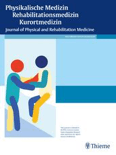
PHYSIKALISCHE MEDIZIN REHABILITATIONSMEDIZIN KURORTMEDIZIN
Empowering Recovery: Insights from the Heart of Rehabilitation SciencePHYSIKALISCHE MEDIZIN REHABILITATIONSMEDIZIN KURORTMEDIZIN, published by GEORG THIEME VERLAG KG, is a prominent journal dedicated to the fields of physical medicine, rehabilitation, and resort medicine. With its ISSN of 0940-6689 and E-ISSN 1439-085X, this journal has been at the forefront of disseminating essential research and innovative practices since its inception. Operating from Germany, it offers a crucial platform for professionals, researchers, and students engaged in exploring the latest advancements in rehabilitation methodologies and therapeutic practices. Although it currently holds a Q4 ranking in several categories including Physical Therapy and Rehabilitation, the journal is committed to enhancing its impact and visibility within the academic community. The journal publishes research, reviews, and clinical studies aimed at improving patient outcomes and advancing the science of rehabilitation. Subscribers can expect high-quality content that addresses both theoretical and practical aspects of rehabilitation medicine, ultimately contributing significantly to ongoing discussions and developments in the field.
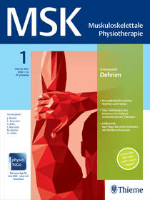
MSKMuskuloskelettale Physiotherapie
Unlocking the potential of musculoskeletal rehabilitation techniques.MSK Muskuloskelettale Physiotherapie is a leading academic journal dedicated to the field of musculoskeletal physiotherapy, exploring innovative practices, research findings, and clinical advancements. Published by GEORG THIEME VERLAG KG, a reputable name in medical publishing, this journal aims to serve as a vital resource for professionals, researchers, and students alike who are passionate about enhancing patient care and therapeutic techniques within the musculoskeletal domain. With its commitment to open access, MSK Muskuloskelettale Physiotherapie ensures that cutting-edge research is readily available to a global audience, facilitating the exchange of ideas and fostering collaboration across disciplines. As the field evolves, this journal seeks to provide a comprehensive platform for the latest developments, emerging methodologies, and transformative insights that are essential for advancing knowledge and practice in musculoskeletal health.

Frontiers in Rehabilitation Sciences
Fostering collaboration to revolutionize rehabilitation methodologies.Frontiers in Rehabilitation Sciences, published by FRONTIERS MEDIA SA, is an innovative open-access journal that has been committed to advancing the discipline of rehabilitation science since its inception in 2021. The journal aims to serve as a platform for researchers, clinicians, and students interested in disseminating high-quality research and insights that drive practice and policy in rehabilitation and physical therapy. With an E-ISSN of 2673-6861, it fosters interdisciplinary collaboration, tackling topics that range from therapeutic interventions to sports rehabilitation and beyond. As part of the Frontiers family, the journal employs cutting-edge open-access policies that ensure widespread dissemination and visibility of research findings. Although it is currently ranked within the lower quartiles based on Scopus rankings, the journal provides an invaluable opportunity for emerging scholars to publish their work in a rapidly evolving field. By sharing knowledge and fostering dialogue among scientists and practitioners alike, Frontiers in Rehabilitation Sciences plays a crucial role in shaping the future of rehabilitation methodologies and improving patient outcomes.
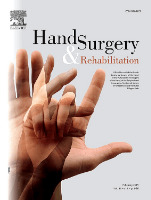
Hand Surgery & Rehabilitation
Unveiling New Horizons in Hand RehabilitationHand Surgery & Rehabilitation, published by ELSEVIER, is a vital resource for researchers, clinicians, and students engaged in the fields of orthopedics, rehabilitation, and surgery. With an ISSN of 2468-1229 and an E-ISSN of 2468-1210, this journal has established a prominent presence since its inception in 2016, with a convergence period extending until 2024. It holds a commendable ranking in the Q2 category within Rehabilitation and Surgery, as well as a Q3 classification in Orthopedics and Sports Medicine for the year 2023. With a Scopus Rank of #290/551 in Surgery and #86/161 in Rehabilitation, it exemplifies the ongoing pursuit of excellence in its domain. As an open access journal, it provides a platform for sharing significant research findings and advancements in hand surgery and rehabilitation, thereby contributing to the enhancement of clinical practice and patient outcomes. Engaging with this journal places professionals at the forefront of the latest developments in these critical areas of medicine, promoting interdisciplinary collaboration and fostering innovation.
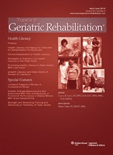
TOPICS IN GERIATRIC REHABILITATION
Bridging Research and Practice in Geriatric RehabilitationTopics in Geriatric Rehabilitation is a premier scholarly journal dedicated to advancing the field of geriatric rehabilitation, published by Lippincott Williams & Wilkins. With the ISSN 0882-7524 and an E-ISSN of 1550-2414, the journal has been a vital resource since its inception in 1985, providing a platform for innovative research and clinical studies that address the rehabilitation needs of older adults. It features a diverse range of articles that contribute significantly to the understanding of geriatric care practices, physical therapy, and rehabilitation strategies. Although currently categorized as Q4 in Geriatrics and Gerontology and Q3 in both Physical Therapy, Sports Therapy, and Rehabilitation, and general Rehabilitation, the journal continually strives to improve its scholarly impact and visibility within the medical community. The journal's eclectic content is invaluable for researchers, clinicians, and students alike, aiming to foster a better understanding of geriatric rehabilitation and improve health outcomes for older populations. With plans for expansion in open access options and a commitment to high-quality peer-reviewed content, Topics in Geriatric Rehabilitation remains dedicated to supporting advancements in this crucial field.